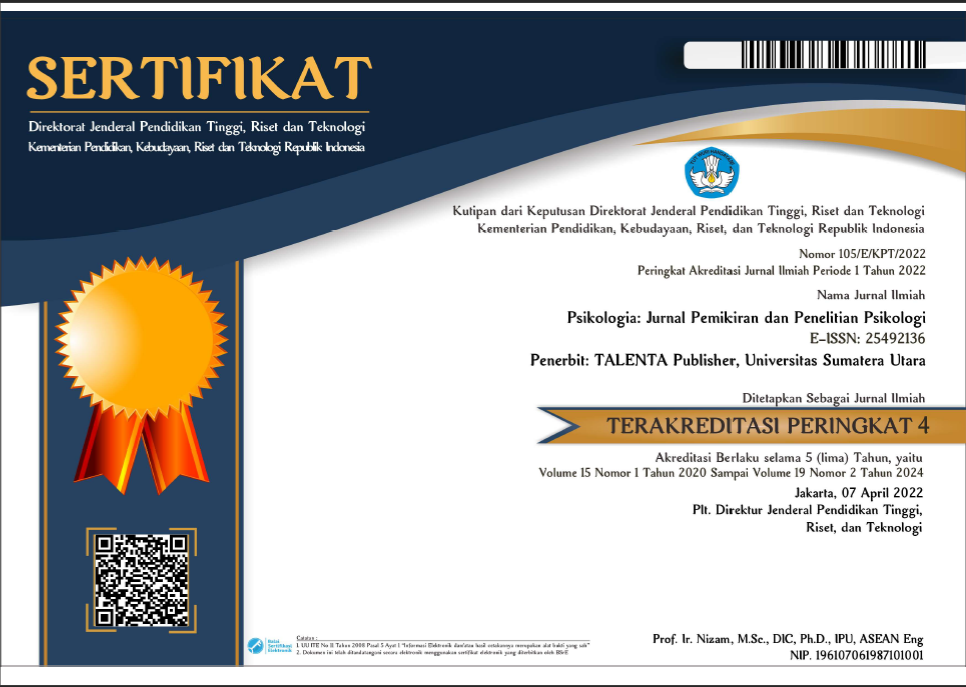Lack of organizational justice increase counterproductive work behavior: A study in Medan
Rendahnya keadilan organisasi meningkatkan perilaku kerja kontraproduktif: Sebuah study di Medan
DOI:
https://doi.org/10.32734/psikologia.v15i1.4392Keywords:
counterproductive work behavior, organizational justice, perilaku kerja kontraproduktif, keadilan organisasi, karyawan, employeesAbstract
Employees' attitudes and behaviors are crucial in determining the success of an organization. However, employees sometimes behave in undesirable ways that hamper their organization to reach its goals. The present research examines the impact of organizational justice on employees' counterproductive work behaviors. The results of this correlational study showed that employees who had lower perceived organizational justice were inclined to engage in counterproductive work behaviors than those who possess higher perceived organizational justice. We discussed the importance of organizational justice as a means to reduce counterproductive behaviors.
Sikap dan perilaku karyawan sangat penting dalam menentukan keberhasilan suatu organisasi. Namun, karyawan terkadang berperilaku yang tidak diinginkan, yang dapat menghambat organisasi untuk mencapai tujuan. Penelitian ini mengkaji dampak keadilan organisasi pada perilaku kontraproduktif karyawan. Hasil penelitian korelasional ini menunjukkan bahwa karyawan yang memiliki persepsi keadilan organisasional yang rendah cenderung berperilaku kontraproduktif dibandingkan dengan karyawan yang memiliki persepsi keadilan organisasional yang tinggi. Kami membahas pentingnya keadilan organisasi sebagai sarana untuk mengurangi perilaku kontraproduktif.
Downloads
References
Aguinis, H., dan Bradley, K. J. (2014). Best practice recommendations for designing and implementing experimental vignette methodology studies. Organizational Research Methods, 17, 351–371. https://doi.org/10.1177/1094428114547952
Blader, S. L., dan Tyler, T. R. (2009). Testing and extending the group engagement model: Linkages between social identity, procedural justice, economic outcomes, and extrarole behavior. Journal of Applied Psychology, 94, 445–464. https://doi.org/10.1037/a0013935
Burke, R. J., dan Cooper, C. L. (2016). Human frailties: Wrong choices on the drive to success. New York: Routledge.
Colquitt, J. A. (2001). On the dimensionality of organizational justice: A construct validation of a measure. Journal of Applied Psychology, 86, 386–400. https://doi.org/10.1037/00219010.86.3.386
Devonish, D., dan Greenidge, D. (2010). The effect of organizational justice on contextual performance, counterproductive work behaviors, and task performance: Investigating the moderating role of ability-based emotional intelligence. International Journal of Selection and Assessment, 18, 75–86. https://doi.org/10.1111/j.1468-2389.2010.00490.x
Dyne, L. V., Ang, S., dan Botero, I. C. (2003). Conceptualizing Employee Silence and Employee
Voice as Multidimensional Constructs. Journal of Management Studies, 40, 1359–1392. https:
//doi.org/10.1111/1467-6486.003845
Fox, S., Spector, P. E., dan Miles, D. (2001). Counterproductive work behavior (CWB) in response to job stressors and organizational justice: Some mediator and moderator tests for autonomy and emotions. Journal of Vocational Behavior, 59, 291–309. https://doi.org/10.1006/jvbe.2001.1803
Josef, E. S. (2017). Pengaruh dimensi keadilan organisasional terhadap perilaku kerja kontraproduktif karyawan. Jurnal Ilmu Manajemen, 3, 1–9.
Kreitner, R., dan Kinicki, A. (2003). Perilaku organisasi. Jakarta: Salemba Empat.
Priyatno, D. (2011). SPSS: Analisis statistik data lebih cepat, efisien, dan akurat. Yogyakarta: Media Kom.
Son Hing, L. S., Bobocel, D. R., Zanna, M. P., Garcia, D. M., Gee, S. S., dan Orazietti, K. (2011).
The merit of meritocracy. Journal of Personality and Social Psychology, 101(3), 433–450. https:
//doi.org/10.1037/a0024618
Spector, P. E., Bauer, J. A., dan Fox, S. (2010). Measurement artifacts in the assessment of counterproductive work behavior and organizational citizenship behavior: Do we know what we think we know? Journal of Applied Psychology, 95, 781–790. https://doi.org/10.1037/a0019477
Tyler, T. R., dan Lind, E. A. (1992). A relational model of authority in groups. In M. P. Zanna (Ed.), Advances in experimental social psychology (Vol. 25, pp. 115–191). https://doi.org/10.1016/S0065-2601(08)60283-X
Wibowo. (2017). Perilaku dalam organisasi. Jakarta: Rajawali Press
Downloads
Published
How to Cite
Issue
Section
License
Copyright (c) 2020 Psikologia: Jurnal Pemikiran dan Penelitian Psikologi

This work is licensed under a Creative Commons Attribution-ShareAlike 4.0 International License.








